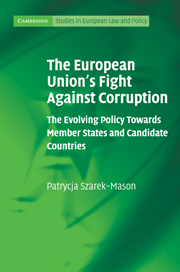 The European Union's Fight Against Corruption
The European Union's Fight Against Corruption Published online by Cambridge University Press: 03 May 2010
It is in the EU's vital interest to ensure that all the Member States have in place effective policies for preventing and combating corruption. The premise of the EU legal system is that acquis is correctly implemented and enforced by public administration and courts in the Member States. However, widespread corruption within Member States constitutes a threat to the correct application of EU policies and effective implementation of the acquis. It carries particular dangers in the area of freedom, security and justice, where policy increasingly relies on mutual recognition and trust among Member States. The evidence of corruption in the police or in the courts has a destructive effect on that trust among Member States.
Corrupt practices undermine the legitimacy of judgments and arrest warrants issued by judicial authorities across Member States. In addition, criminal organisations and terrorists may use corruption to penetrate the structures of Member States and pursue their illicit goals. Above all, however, corruption undermines the principles of democracy and the rule of law, which as prescribed in Article 6 EU Treaty are fundamental to the functioning of the EU and common to all Member States. To prove its commitment to these principles, the EU must have a genuine policy addressing the problem of corruption within its Member States.
One other important reason for developing a more comprehensive policy against corruption across Member States is that corruption poses a danger for the regular distribution of EU funds. In particular, around 80 per cent of EU funds are under shared management by the Commission and the Member States.
To save this book to your Kindle, first ensure no-reply@cambridge.org is added to your Approved Personal Document E-mail List under your Personal Document Settings on the Manage Your Content and Devices page of your Amazon account. Then enter the ‘name’ part of your Kindle email address below. Find out more about saving to your Kindle.
Note you can select to save to either the @free.kindle.com or @kindle.com variations. ‘@free.kindle.com’ emails are free but can only be saved to your device when it is connected to wi-fi. ‘@kindle.com’ emails can be delivered even when you are not connected to wi-fi, but note that service fees apply.
Find out more about the Kindle Personal Document Service.
To save content items to your account, please confirm that you agree to abide by our usage policies. If this is the first time you use this feature, you will be asked to authorise Cambridge Core to connect with your account. Find out more about saving content to Dropbox.
To save content items to your account, please confirm that you agree to abide by our usage policies. If this is the first time you use this feature, you will be asked to authorise Cambridge Core to connect with your account. Find out more about saving content to Google Drive.